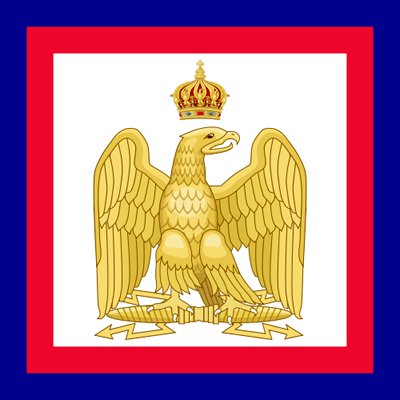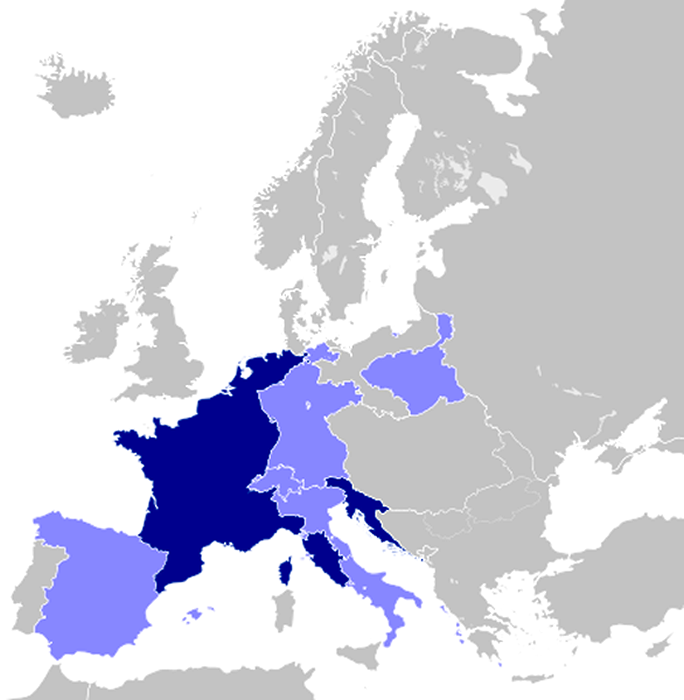 Napoleonic Empire
Napoleonic Empire

(Text by Duane R. Hurst © 2013)
Click on a link to view its information and pictures.
|
NAPOLEON LINKS: Significant Event: Battle of Austerlitz 2 Dec 1805 AD Battle of Waterloo 18 June 1815 AD Moscow Retreat Napoléon Visits the Sphinx Main Cities: Paris Time: 1804-1815 AD Language: French Personage: Joséphine; Napoléon Religion: Christianity Related Country: France Brief History: I have included only a few items concerning the history of this empire. A good source for more details can be found on Wikipedia or in history books. |
|
|
EARLY YEARS:
A young Napoléon from Corsica supported the Jacobin faction as a Lieutenant-Colonel over the militia. In July 1793 AD, he commanded republican artillery at the Siege of Toulon, which British troops had occupied. Due to other successes (such as at Le Mans and Fleurus) Napoléon became a general and gained the favor of Maximilien de Robespierre, key leader of the French Revolution. In 1795 AD, the Committee of Public Safety removed Napoléon for his refusal to accept a demotional posting during War in the Vendée. He gained sudden fame for quashing a royalist insurrection in Paris, thus becoming Commander of the Interior and general over the Army of Italy. He also married Joséphine de Bauharnais. Two days after his marriage on 9 March 1796 AD, Napoléon took command in Italy and later defeated Austrian forces at the Battle of Lodi, driving them out of Lombardy. He also won a battle at the Bridge of Arcole, which allowed Napoléon to subdue the Papal States. In 1797 AD, he forced Austria to negotiate peace and conquered the Republic of Venice, thus ending 1,100 years of its independence. He later quashed a royalist uprising in Paris, returning as a hero. EGYPTIAN CAMPAIGN: In 1798 AD, Napoléon led a military expedition against Egypt. His ultimate goal was to link with Tipu Sultan (who ruled the Kingdom of Mysore) against the British. En route to Egypt, the Knights Hospitallers at Malta surrendered to the French. His force landed at Alexandria and defeated the Mamluks under Murad Bey at Shubra Khit. During a July Battle of the Pyramids, Napoléon utilized a battle square to defeat another Mamluk force. However, his troops suffered a decisive defeat in Battle of the Nile. British Rear-Admiral Horatio Nelson's ships destroyed the French flagship, L'Orient and most of the French fleet. EMPIRE: Napoléon returned to Paris in October 1799 AD and effectively became ruler of France in November. In May 1803 AD, Britain broke the Peace of Amiens and declared war with France. Austria and Russia joined a coalition against France and Spain. Plans to invade England ended with defeat of a French fleet at Cape Finisterre in July 1805 AD. Napoléon triumphed at Ulm but a British fleet won the following day at Trafalgar. Six weeks later Napoléon gained a spectacular victory at Austerlitz. He likewise succeeded in dismembering the Habsburg Empire and signed alliances with Emperor Selim III of the Ottoman Empire and Fat'h-Ali Shah Qajar of Persia against Russia. It was short-lived when Napoléon chose to ally with Russia in 1809 AD. FOURTH COALITION & PENINSULAR WAR: Napoléon formed a Fourth Coalition in 1806 AD and defeated Prussia. He then marched through Poland to fight a stalemate with Russian troops at Eylau in East Prussia. Following a victory at Friedland, Napoléon installed puppet rulers over Prussia and other German states. Czar Alexander I of Russia and France also divided continental Europe into spheres of influence. Napoléon considered his experiences in Spain to be a major mistake, including the placement of his brother on the Spanish throne and an invasion of Portugal in 1807 AD. His army faced guerrilla warfare even after defeating the Spanish army, taking Madrid, and driving a British army to the coast. Napoléon left 300,000 troops to occupy the region, while he confronted a resurgent Austrian war. British and Portuguese troops defeated the French at Salamanca in July 1812 AD. Despite a defeat at Aspern-Essling, Napoléon later triumphed at Wagram and forced a peace treaty with Austria. French forces later suffered defeat in 1813 AD at Dennewitz. Napoléon also annexed the Papal States and accepted excommunication from Pope Pius VII. French soldiers seized the Pope, who endured imprisonment until May 1814 AD. Napoléon likewise imprisoned 13 Catholic cardinals for not attending his marriage to Austrian Archduchess Marie Louise (after divorcing Joséphine). INVASION OF RUSSIA: In June 1812 AD, Napoléon committed his most disastrous error by invading Russia after Russian nobles convinced Czar Alexander I to break its treaty with France. Napoléon won a costly battle near Moscow at Borodino. Russian forces withdrew and the French entered a capital burned at the order of Moscow's mayor, Fyodor Rostopchin. Fearing a loss of control back in France, Napoléon ordered a disastrous winter retreat that reduced his original army of over 400,000 to fewer than 40,000 troops. He further exacerbated the dire situation because he earlier refused to manumit Russian serfs, who later attacked the withdrawing troops. Emboldened by the Russia debacle, a new anti-French coalition formed that included: Austria; Britain; Portugal; Prussia; Russia; Spain; and Sweden. Napoléon triumphed at Dresden, lost at Leipzig, and withdrew his weakened forces back to France. Coalition forces captured Paris in March 1814 AD despite Napoléon's victories in a Six Days' Campaign. The allies exiled Napoléon to the Italian island of Elba. WATERLOO: On 26 February 1815 AD, Napoléon escaped from Elba and took command of France for 100 days. He launched an attack against British and Prussian armies commanded by Wellington and Blücher. French cuirassiers repulsed an initially successful attack from British cavalry, but failed against strong British squares and the ever-valient Highlanders. In a final attempt to wrest a victory, Napoléon ordered the previously undefeated Imperial Guard forward in a doomed attack. Their decimated ranks refused to surrender. Allies again exiled Napoléon -- to the small British island of Saint Helena, where he allegedly died on 5 May 1821 AD. Although one report claimed that Napoléon did escape but died from a gunshot wound while attempting to enter a home in Paris. |
|
|
© Page Publisher: Duane R. Hurst
|


